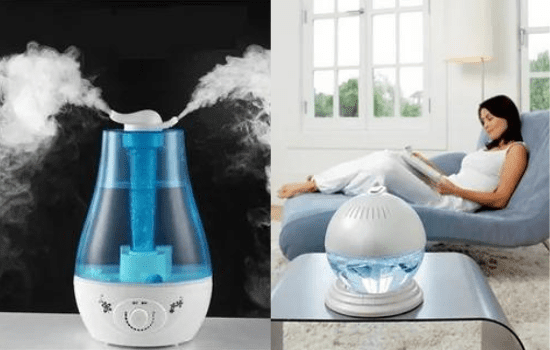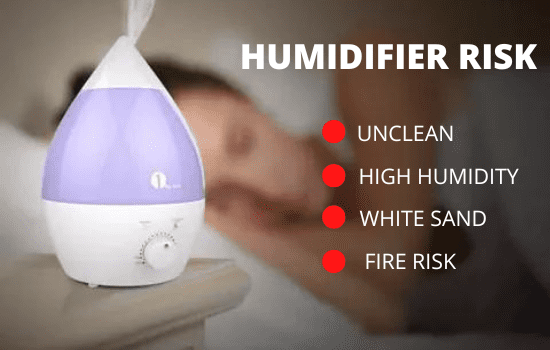Everyone needs a good sleep. The best solution to get rid of your fatigue is sleep. One of the best gadgets to improve your sleep is a humidifier. A humidifier has lots of benefits while sleeping.
Humidifiers are devices that increase the air’s moisture levels, or humidity. It improves the quality of your sleep and makes you feel more refreshed in the morning. Humidifiers can be wonderful sleep aids. When the weather is dry, humidifiers can be an excellent way to improve humidity. There are benefits of humidifiers.
Advantages of Humidifier

A humidifier helps in Better skin hydration
When it comes to skin health, it’s important to keep your skin hydrated and fresh, which a humidifier can help you do. Properly hydrated skin has an even texture and looks younger. Overall, humidifiers are a great way to increase the health of your skin and immune system so you can stay healthy all year long, regardless of the weather.
A humidifier helps in decreasing snoring
Lots of people snore. snoring is a problem that can cause small vibrations to loud and irritating noises. A humidifier can lessen sleep apnea and snore. dry air usually causes snoring. A person’s airways are almost always dry when the air is dry, which might increase throat irritation and snoring. A humidifier increases the amount of moisture in the air. The increasing humidity will reduce the number of allergies in the air in your home. Allergens in dry air can cause throat irritation and disturbed sleep.
Helps to Keep respiratory illnesses away
Dry air can make bronchitis, asthma, and even the influenza virus much easier to develop causing bloody noses. Using a humidifier helps reduce your risk of getting sick during the winter by maintaining your nasal passages moist. It is one of the best benefits of a humidifier.
It helps to prevent coughs or hoarseness.
Vocal cords may become dry and scratchy if they are exposed to too little moisture in the air. Humidifiers are useful in the treatment of croup, a children’s illness that results in inflammation of the upper airways, a cough, and hoarseness.
Helps in Sinusitis Disease
People all around the world also commonly use humidifiers to treat conditions like sinusitis because they help to reduce difficulties with mucus secretions by increasing the moisture in the nose.
It helps to reduce bleeding nose issues.
Because humidifiers keep your nasal passage moist, bleeding nose issues are avoided when you leave one on while you sleep. A regular humidifier helps to permanently end the bleeding nose issue.
Humidifiers Reduce the Spread of Viruses
This is a general benefits o humidifier; they help stop the spread of viruses, which is normally increased in the winter. You are more likely to contract an infection if the air is dry because it makes it simpler for viruses to spread and live in the atmosphere.
You should definitely keep your humidifier on, if not all night, to avoid or reduce your risk of contracting an infection. The humidifier will supply essential moisture, stop the growth of germs and viruses in the air, and aid your body in more effectively fighting them off.
It helps to prevent your home from damage
Your home may sustain damage from dry air as well. Wood requires a consistent degree of moisture. Low humidity dries up wood furniture over time, causing it to crack. A wood floor’s joints may become looser as a result. Your wood furniture can be given new life by using a humidifier, which will increase its lifespan. Additionally, it greatly improves the color of indoor plants.
It helps in making humidity levels in hair and scalp
Humidifiers help in healthy hair and scalp. Your scalp may get dry and irritated when there is not enough moisture in the air, much like the rest of your body’s skin. This could make your scalp itchy and make your dandruff worse. Your hair can also be impacted. Hairs require a specific quantity of moisture because it is made of collagen. Your hair may become dry and cracked if it is exposed to dry air for a long period of time. This is helped by having acceptable humidity levels.
Preventing the flu
Humidifiers may lower the risk of contracting the flu. Humidity levels rapidly inactive virus particles, making them considerably less likely to be infectious. This is especially true for the influenza virus and the common cold. If you already have a cold or the flu, a humidifier can be helpful. Dry coughing from breathing in dry air can keep you awake at night. By increasing the humidity in the air, you can get more moisture into your body, cough more effectively, and sleep more soundly.
Makes you warmer
Adding moisture to the air can retain heat and make your room feel warmer if you don’t like to sleep in the cold. Instead of making you feel colder and turning up the heat, humidity brings the temperature of the air close to you. It is a very good benefit of a humidifier.
Additionally, humidifiers help prevent dry, itchy throats in the morning. The vapors circulate in your airways while you sleep helps to moisturize the mucous membranes in your throat and nose. This keeps airways from closing or drying up, which could lead you to wake up in the middle of the night or with an itchy throat. It is another one of the best benefits of a humidifier.
It helps in easing the breath.
To breathe properly, our bodies require a particular percentage of humidity in the air, typically between 30 and 50 percent.
Your nasal passages may dry out and become blocked if the air is too dry. In some circumstances, this can result in sinus infections or tightness.
You can breathe more easily at night and add moisture to the air by using a humidifier. Additionally, it can aid with nasal and throat cleaning, which will make it simpler for you to go asleep.
Also read: Best Sinus Medicine & Home Remedies
The risks of humidifiers

While there are undoubtedly some benefits of humidifiers for sleep, there are also some disadvantages.
Unclean humidifiers
Regardless of the type of humidifier you select, make sure to clean it routinely. The development of bacteria, and fungus, from standing water in the device, can worsen allergy symptoms and potentially cause respiratory issues like pneumonia.
Although many humidifier tanks can be put in the dishwasher, make sure to follow your device’s cleaning instructions. It’s important to clean your humidifier’s filters as well.
Tips to clean humidifier
Use distilled water
The minerals in tap water may cause deposits inside your humidifier that encourage the development of bacteria. You could also inhale in some minerals that have been spread in the air. Overall, distilled water has contains fewer minerals than tap water.
Regularly replace the water in the humidifier.
Do not let deposits or mist form within your humidifiers. If at all possible, empty the tanks, dry the inside surfaces, and fill them back up with fresh water every day, especially if you’re using cool-mist or ultrasonic humidifiers. First, unplug the device.
Every three days, clean the humidifier.
Before cleaning the humidifier, unplug it. Utilize a 3 percent hydrogen peroxide solution, to remove any mineral buildup or dust from the humidifier’s tank or other parts.
When cleaning the tank, always wash it. This can prevent dangerous substances from dispersing into the air and being inhaled.
Regularly replace the humidifier’s filters.
Change the humidifier’s filter if one is present at least as regularly as the manufacturer advises, and more commonly if it’s dirty.
Risk of fire
Humidifiers can get really warm as they operate. Because of this, using humidifiers for long periods of time carries a risk of fire. Cold mist humidifiers should be used all night long, to reduce the risk of fire and other associated dangers. Additionally, it is not advised to leave the humidifiers running if elderly people are left alone at home.
High Humidity
Every night using your humidifier while you sleep can be very beneficial to your health. However, it’s essential to keep an eye on the humidity levels in your house to make sure they stay within the ideal range.
White sand
The formation of small minerals known as “white dust” might occur in your humidifier as a result of using tap or unfiltered water. The mineral deposits that are left behind on surfaces when the mist is emitted from your humidifier device produce a thin, white film that looks like white dust.
To function effectively, the majority of humidifiers need to be filled with distilled or filtered water. Before filling the water tank, make sure to read the instruction booklet on the device to prevent any problems.
Wrapping Up
Purchasing a humidifier might be a smart move if you struggle with sleep or respiratory-related health issues. The humidifier will definitely relieve symptoms or possibly stop respiratory problems and it has lots of benefits. Although humidifiers are the ideal sleep aid, it’s crucial to remember that you should only use your humidifier when required.
It is critical to keep in mind that underlying disorders like asthma cannot be treated by humidifiers. They might be helpful, but they shouldn’t take to used the place for medical care.
When using a humidifier, anyone who notices new or increasing symptoms should stop using it and call their physician.




